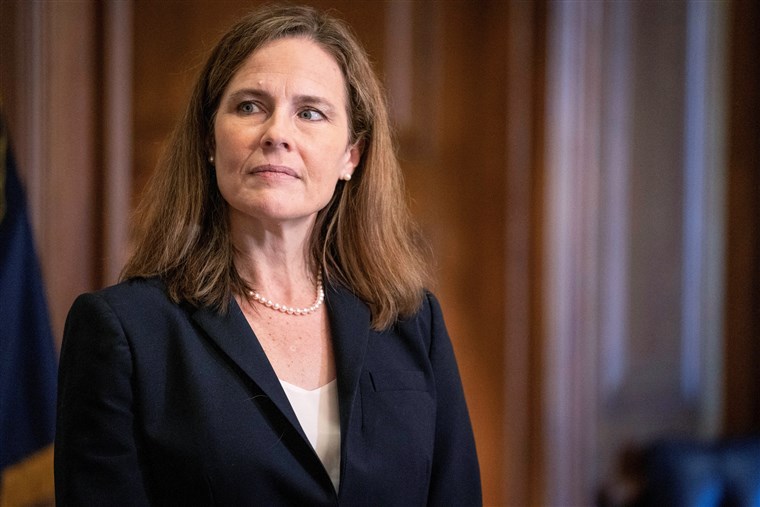Opinion: The Amy Coney Barrett confirmation could be bad for everyone
Amy Coney Barrett was confirmed to the Supreme Court of the United States this past Friday.
November 2, 2020
One of the most controversial Supreme Court nominees of all time, Amy Coney Barrett, was confirmed to the Supreme Court on Oct. 26 by a 52-48 vote, just eight days before the election. The circumstances surrounding her nomination have been contested for weeks, as the 2016 precedent of not allowing a nomination in an election year was bypassed. With a Republican-controlled Senate, it does not come as a surprise that they would bypass precedent to advance their own agenda, but with the confirmation of Judge Barrett it’s important to look at what this could mean for the rights of U.S. citizens everywhere.
Since her nomination, the Roe v. Wade decision, which made abortion legal across the U.S., has once again come into the spotlight. The New York Times reports that “groups opposing abortion have championed Judge Barrett’s nomination.” The New York Times also reports “Her academic and judicial writings have been skeptical of broad interpretations of abortion rights.” Although this doesn’t seem to pose an immediate threat to abortion rights, it may indicate her willingness to cut down on them over time.
A major ruling such as Roe v. Wade is difficult to overturn, but over the years through Congress, state government, and the Supreme Court, access to safe and legal abortions has been slowly infringed upon. The Washington Post even stated that “Barrett’s decision to sign a newspaper advertisement in 2006 that decried the ‘barbaric legacy’ of Roe v. Wade is instructive.” Although views can change, looking at her history, it seems her stance on abortion rights is clear; she will not support women’s right to choose.
The importance of protecting these freedoms can’t be stressed enough, as there are many instances where having a baby could be deadly for the mother. In fact, it should not be the place of anyone besides the mother to decide whether or not they should keep the baby, and there are far too many scenarios in which an abortion is wanted or necessary. Taking these freedoms away is not only the first step to more legislation that infringes upon women’s rights, but it could cause women to be in a potentially fatal situation.
Another case that has come into the spotlight since the nomination is Obergefell v. Hodges, the landmark 2015 case that granted marriage equality to same-sex couples. In addition, NBC News reports that both Jim Obergefell and Rick Hodges have joined together to “oppose the nomination of Judge Amy Coney Barrett to the high court.” Both the defendant and the plaintiff in the landmark case coming together is a major red flag, as they likely believe that the ruling of their case is at risk of being overturned with her confirmation. NBC News also reported that “Justices Samuel Alito and Clarence Thomas, two of the case’s four dissenters, again criticized that ruling earlier this month…” With two justices already voicing their disapproval of the case, the addition of Barrett could prove to be disaster for LGBTQ+ rights.
According to USA Today, “Barrett said it would ‘strain’ the text of Title IX to allow transgender people to use public restrooms that match their genders, categorizing trans women as ‘males’” at a 2016 lecture, a clear indication that Judge Barrett is against at least some LGBTQ+ rights, especially those of the transgender community. Business Insider also noted that “…[Amy Coney Barrett] refused to say whether she agrees with the Supreme Court’s landmark rulings protecting access to contraceptives and LGBTQ+ rights during her Senate confirmation hearing on Wednesday.” Choosing not to state an opinion is a red flag in and of itself. If she refuses to state whether she agrees with cases granting LGBTQ+ rights, it adds onto a clear indication that she is willing to overturn these rights, along with Justices Samuel Alito and Clarence Thomas.
The overturning of marriage rights for the LGBTQ+ community would affect millions of Americans, as well as promote the idea that being a part of the community is “wrong.” It could also pave the way for more rights to be overturned for the LGBTQ+ community. This clearly promotes discrimination and inequality, as sexuality and gender equality should not be something that is opposed or contested as a political stance. If these ideas are encouraged in the highest court it could normalize homophobia and bigotry.
Barrett’s nomination also threatens the Affordable Care Act (ACA), commonly known as Obamacare. President Trump has been vocal in his disapproval for the Affordable Care Act, despite never proposing his own opposing healthcare plan. His nomination would, surely, be someone who would help strike down the ACA. Judge Barrett was asked to make assurances on how she’d rule in an ACA case, and NPR reports she responded with “’Absolutely not,’…‘I was never asked, and if I had been that would have been a short conversation.’” Her refusal to answer the question definitely raises concern on how she would rule in this type of case. The Center for American Progress states that over 20 million Americans would lose healthcare coverage if the ACA was overturned. If Judge Barrett and the 6-3 Republican majority on the court vote to overturn it, this could mean disaster for over 20 million Americans, who won’t have access to healthcare without it.
While Barrett hasn’t explicitly confirmed her stance on these issues, her past writings, opinions, and answers, or lack thereof, at the Senate hearing speak volumes. Amy Coney Barrett poses a threat to the rights of millions of Americans. It raises the question: why should the rights of millions be decided by a six-person majority? This opens the discussion for Supreme Court reform, such as adding more seats or term limits for justices. The evidence is clear, though, that the rights of millions shouldn’t be at risk because of one justice.







